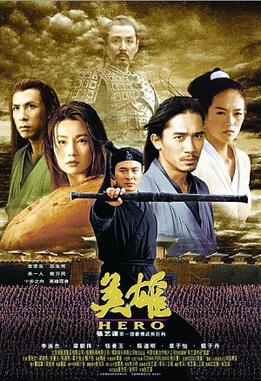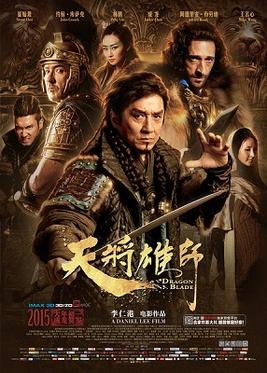Much like there were many Swords & Sorcery films released in the wake of the epic "Conan the Barbarian" (1982), there were a number of Wuxia movies at the turn of the century that sought to capitalize on the popularity of "Crouching Tiger, Hidden Dragon" (2000).
This week, I wanted to take a look at one of the better efforts, "Hero" (2002):
This week, I wanted to take a look at one of the better efforts, "Hero" (2002):
Very, very loosely based on the story of Jing Ke's assassination attempt on the King Zheng of Qin (who would go on to become Emperor Qin Shi Huang, founder of the Qin Dynasty) in 227 BC, "Hero" is a low fantasy historical adventure film by "Fifth Generation" director Zhang Yimou.
Set in the Warring States period of China, the story follows a nameless swordsman (appropriately named Nameless), a minor government official who purportedly has killed three assassins (Sky, Snow, Broken Sword) who have been giving King Zheng sleepless nights and caused him to take drastic security measures. This gets Nameless an audience with the King and what follows is a cat and mouse game between the two, and we see various versions of the events (a la Rashomon (1950)), as the King drills down to the surprising truth.
Compelled to surpass "Crouching Tiger, Hidden Dragon" (directed by Taiwanese multiple Academy Award winner Ang Lee) out of nationalistic pride, "Hero" was the most expensive mainland Chinese film to that date, with an all-star cast headlined by legendary martial arts star Jet Li and including Hong Kong staples Tony Leung and Maggie Cheung, "Crouching Tiger" starlet Zhang Ziyi and long time mainland Chinese actor Chen Daoming.
"Hero" has solid wuxia action, especially between Li and fellow action star Donny Yen. The other action scenes are more dreamlike, but are still fine. One of the best parts of the film is the amazing cinematography, featuring amazing landscapes and gorgeous use of color.
However, the story has some issues, not the least of which is, without completely spoiling the ending, that this movie was unsurprisingly criticized in the West as being pro-authoritarian. By this, I mean that, unlike the position taken by the film, the people of the Warring States didn't really have a sense of being part of one country at that time, while the film has a clear message of the importance of sacrificing lives and liberty in favor of central power.
Unsurprisingly, this is exactly the message that the Chinese Communist Party pushes. And, as Director Zhang Yimou is a loyal member of the Communist Party, it's not surprising that he was awarded the prestigious position of directing the Opening Ceremonies of the 2008 Beijing Olympics.
Anyway, "Hero" is a fine entry in the wuxia genre. However, take its historicity with a giant boulder of salt and it's better to enjoy the film as pretty but vapid entertainment.














